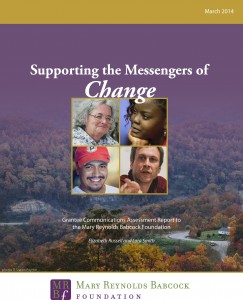This is a guest post by Lora Smith, Communications Officer at the Mary Reynolds Babcock Foundation.
 Public policy discussion has always been a cornerstone of American democracy.
Public policy discussion has always been a cornerstone of American democracy.
Policy change can’t happen without constructive public discourse and influence. Getting to that influence involves persuasive conversations and well-framed messages. Policy advocacy organizations must reach and effectively communicate to diverse audiences, and continually deliver compelling data and narratives in order to achieve their desired outcomes. At its very core, policy advocacy is an exercise in strategic communications.
However, a recent report from the Mary Reynolds Babcock Foundation finds that policy advocacy organizations may suffer from a lack of capacity when it comes to communications, frustrating their attempts to change conversations and ultimately change policy decisions.
The report, Supporting the Messengers of Change, is based on surveys and interviews with 38 foundation grantees in 11 Southeastern states. The authors found that while these policy organizations are making heroic efforts to conduct outreach and communicate effectively, many are swimming upstream against a strong current of hostile politics, a rapid shift from traditional to social media landscapes, and residual financial strain from the recent recession.
Politically, the social policies for which most organizations advocate have become seriously threatened or have experienced significant budget cuts or policy changes in recent years, intensifying the need for advocacy communications. In several cases, organizations reported that the political dynamic in which they operate has become increasingly hostile, and that where they once had supporters (or at least a receptive audience) on both sides of the legislative aisle, they now are met with closed doors.
In terms of media landscape, many organizations are still struggling to find the right balance of time and attention to pay to traditional news outlets (such as newspapers, TV and even established bloggers), and increasing social media channels in their communities. This challenge is particularly hard for organizations serving rural areas, where the decline in traditional media has yet to be replaced by meaningful social and online outreach in smaller markets.
As budgets for social services have diminished, so have the donations of supporters, leaving policy advocacy organizations – like their nonprofit brethren everywhere – to do more with less.
Of course, not all communications capacity challenges are external. The majority of survey respondents had not devoted time or resources to developing strategic communications plans to guide their work, a problem that might be tied to another internal shortcoming — the lack of enough communications staff and internal expertise, especially in the realm of social media. And finally, most policy advocacy organizations interviewed did not or could not dedicate funding specifically to communications activities.
Policy advocacy groups also operate mostly in a vacuum when it comes to supportive networks for communications or policy advocacy, at least in the South. This means opportunities for peer support and idea-sharing about strategic communications are hard to come by. In discussions about networks, policy organizations often pointed to the fact that advocacy messages developed by national organizations often did not resonate in their communities, and that regional (or even state-based) messages are needed.
So, how can foundations help? The Mary Reynolds Babcock Foundation makes the following recommendations in its report:
- Update information within the foundation’s resource library to include best practices and guides for communications and communications technology.
- Help expand the reach of successful policy and/or communications networks in the region.
- Support organizational development specifically for enhancing communications effectiveness.
- Deepen the role of communications staff to help bolster communications outcomes among grantees and share stories of successful strategic communications.
Download the complete report here.
Kris Putnam-Walkerly is a philanthropy expert and consultant. If you found this blog post useful, please subscribe. On Twitter? Follow me @Philanthropy411.






